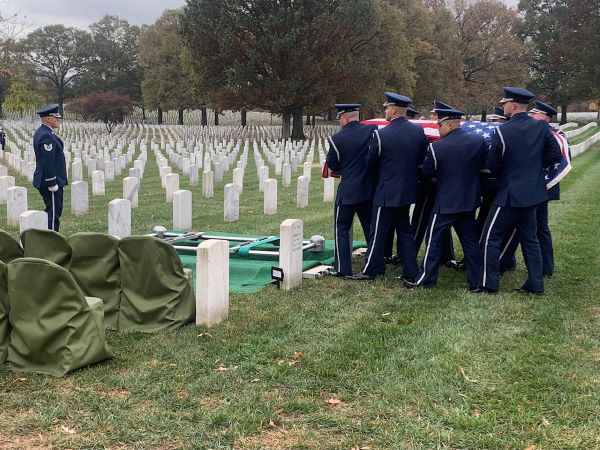
U.S. Air Force Capt. Elizabeth “Liz” Franklin Orser served her country in two different wars and two different military branches. She was a communications officer in the U.S. Marine Corps during World War II and a flight nurse in the U.S. Air Force during the Korean War. Orser, who always believed in her country and took great pride in her service, passed away on June 10, 2025, at the age of 104.
Less than six months later, on Nov. 3, 2025, Orser’s two daughters, Judy Orser and Joyce Mann, along with their families and friends, gathered in Section 60 of Arlington National Cemetery to lay her to rest with her husband, Air Force Col. Leon Orser, who passed in 1977.
Born and raised in east Tennessee, Orser earned her commission into the Marine Corps in 1943, at the height of the war. After attending communications school and serving stateside, she was assigned to Marine Corps Air Station Ewa on the Hawaiian island of Oahu in 1945, where she encoded and decoded messages. One day, while in an aircraft, she noticed other planes flying loops and acrobatics, so she asked her pilot what was going on. He told her the war was over.
After the war, Orser graduated from Yale University’s nursing program in 1947 and became a registered nurse, but wanting to be a flight nurse, she resigned her Marine Corps commission and joined the Air Force in the summer of 1950, just as the Korean War began. Upon graduating from flight nursing school, the chief nurse asked her where she wanted to go. She responded, “Where the action is.”
From 1951 to early 1953, Orser spent 16 months flying the wounded from Korean air bases, sometimes coming under fire. During her more than 900 flying hours, she comforted patients as they flew to rear-echelon hospitals in Korea and Japan. When it came time for her to rotate back to the United States, she told a newspaper reporter that she would have liked to stay in Korea a little longer to see the release of the American POWs.
She rarely spoke about her time as a flight nurse. Later in life, she told her daughters about an American soldier who asked her to take a puppy to his friend at another hospital. She checked to make sure all her patients were stable, then accepted the puppy. “She told me that the only one who got sick on that flight was the dog,” said Joyce. She had to clean the aircraft, but she safely delivered the puppy to the friend.
Among the many patients Orser treated was a young officer named Leon, whom she fell in love with and married on Nov. 13, 1953. She had left the Air Force eight months earlier, after he proposed. In 1954, she gave birth to Judy and, in 1959, to Joyce. Orser left the nursing profession altogether to raise her children.
Orser’s service in Korea and the friends she made remained with her for the rest of her life. She became a member of the Society of Air Force Nurses and attended annual reunions all over the country. In the twilight of her years, her daughters drove her to reunions, the last one being in Portland, Oregon, when she was 96.
At her funeral service, U.S. Air Force Chaplain (Maj.) Kevin Pugh, described Orser as, “a devoted mother, a woman of service and a fiercely independent spirit,” adding that her years in the military “shaped a life of duty, quiet bravery and care for others.” He told the gathered mourners how, at age 95, she would rather climb a ladder to sweep the leaves off her roof and clean the gutters than to ask for help, “because she didn't want to put others at risk.”
Several women from the Society of Air Force Nurses paid their respects by laying bouquets of flowers on her casket and reading the poem “She Was There” by nurse Duane Jaeger. The women inserted Orser’s name into the poem, creating stanzas like: “To witness humanity, its beauty, in good times and bad, without judgment, Liz was there.”
Chair of the society, retired Brig. Gen. Linda Stierle, vowed to honor Orser every May and December, as the society does for all nurses, she said, “to remember our nursing friends and colleagues interred here at Arlington National Cemetery, the most hallowed ground in America.”
After the service, Orser’s daughter Joyce, clutching the American flag presented to her by Chaplain Pugh, reflected on her mother’s service. “She stood up for what she wanted and what she believed in, and that was her legacy.”